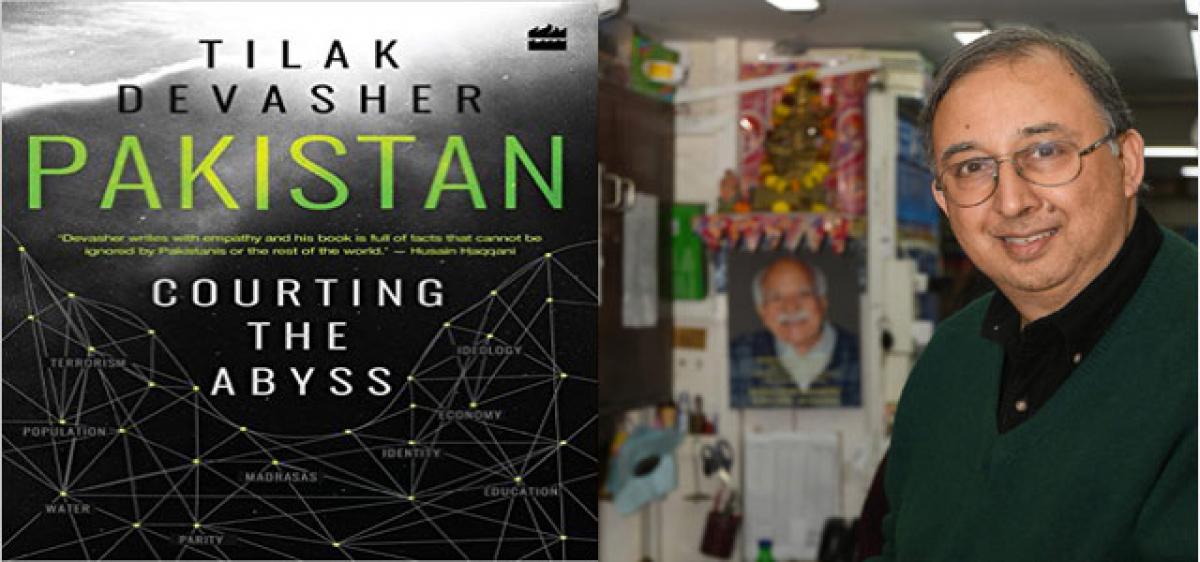Live
- RG Kar protest: Junior doctors to render medical services, carry out hunger strike in parallel
- Traffic Violators Counseled by Nagarkurnool Police
- Bathukamma Celebrations at Government Boys Junior College
- I Will Stand by the Mudiraj Community - MLA Dr. Rajesh Reddy
- Mission Bhagiratha DEE Hemalatha Distributes Certificates to Water Assistants in Achampet
- Elderly Man Dies Suddenly at Bus Stand
- DMK MP Wilson's conduct a threat to judicial impartiality and independence: BJP
- Lightning strikes claim nearly 300 lives in Bangladesh
- Haryana polls: Sohna records highest voting at 68.6 pc, Gurgaon registers lowest turnout
- Multiple attacks in Syria result in casualties
Just In

Tilak Devasher has retired from Cabinet Secretariat, Government of India as Special Secretary in 2014. His continued interest in India’s neighbourhood with a special focus on Pakistan, Bangladesh and Afghanistan, lent to several articles on these countries. His recent book, ‘Pakistan – Courting the Abyss’ explores the inner workings of a nation whose formation was based on religion.
Tilak Devasher has retired from Cabinet Secretariat, Government of India as Special Secretary in 2014. His continued interest in India’s neighbourhood with a special focus on Pakistan, Bangladesh and Afghanistan, lent to several articles on these countries. His recent book, ‘Pakistan – Courting the Abyss’ explores the inner workings of a nation whose formation was based on religion.
Tilak sees the rise of Pakistan army as an important milestone in history of Pakistan. “The first military coup was in 1958 by Ayub Khan, and since then the army has sort of dominated politics. Initially, when Pakistan was formed and Mohd Ali Jinnah and Liyaqat Ali were there; the army was like any other in a civilian establishment. But since, Muslim league was weak, the army and Ayub Khan became stronger and grabbed power, and since then, either openly or behind the scenes, the army controls Pakistan.”
From being a Muslim country, when did Pakistan become an anti-Hindu nation, Tilak explains, “If you look at Jinnah’s demand for creation of Pakistan, it was to have parity between the Congress and Muslim League – and between Hindus and Muslims, even though the Muslims were in a minority.
Partition happened, but this issue of parity continued to be an obsession with Pakistan. And, here lie the roots of animosity that Pakistan has towards India. Further, the Two-Nation theory should have stopped when Pakistan was created, but was continued as ideology. And, to justify the creation of Pakistan, they had to keep projecting India as a Hindu India. So, this animosity just kept getting aggravated.”
In a way it has become important for Pakistan to maintain the anti-India sentiment, he says, “Pakistan has not been able to establish its own positive Pakistan identity, because they found that religion is not an adequate base to sustain a nation; it was just enough to create a nation - as Bangladesh broke away, Sindhis have been up in arms, Balochs have been fighting. It had to rely on anti-India sentiments to sustain the identity of Pakistan.”
And to sustain the anti-India sentiment, extremely distorted version of history is being taught in Pakistani schools, he adds. “For example we know that Jinnah was a secular man, but he is made out to be a devout Muslim, and deliberately hatred is created against Hindus and against India by all kinds of violations and distortions in history.
I have quoted a Pakistani think tank - Sustainable Development Institute (SDPI) – Islamabad. They document the distortions in Pakistani text books, and, how the Hindu is made out to be a very devious man always out to harm Pakistan.”
In his book, Tilak Devasher, not just explores the diplomatic relations that Pakistan has with neighbouring countries, but also its internal problems, most of which, he says, are its own doing – of which the looming water crisis is a pertinent problem. “Its water management is the worst in the world. The country’s agriculture sector is highly inefficient. They use more water per unit of GDP than anywhere else in the world.”
He is quite upfront in his comments on Pakistan in terms of the terrorist organisations that they have helped foster. “Pakistan has decided to use non-state actors as instruments of foreign policy. They have trained the students going to Madrasas and formed these Jihadi organisations, who they feel will fulfill their objectives in Afghanistan as well as India. It comes with state intervention. Today, they are unable to control the jihadist organisations that have started acting within the nation.”
In the book, he examines the root cause of several political, diplomatic and domestic issues that continue to plague the country including education, water management, agriculture, provincial conflicts, its increasing debt with China etc. In short, it is an expert view of what makes Pakistan, what it is today.

© 2024 Hyderabad Media House Limited/The Hans India. All rights reserved. Powered by hocalwire.com







